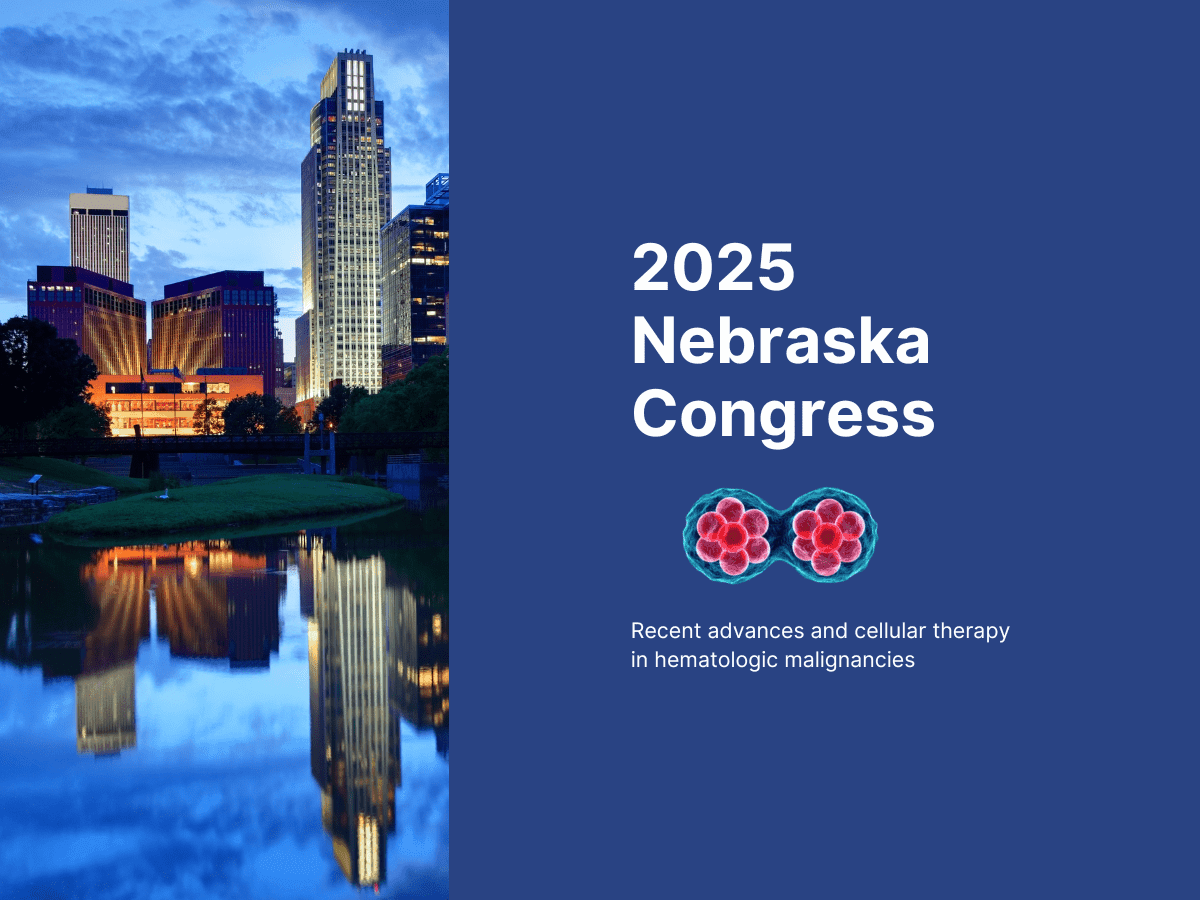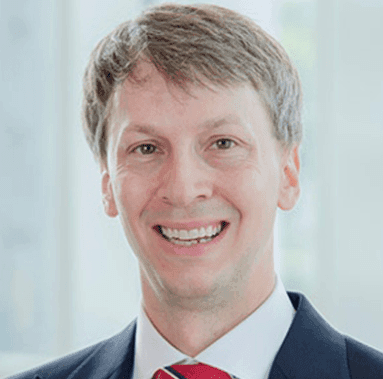2025 Nebraska Congress: Recent advances and cellular therapy in hematologic malignancies

Author
Binaytara Team
Introduction
On April 12, 2025, Dr. Christopher D'Angelo will be co-chairing the Nebraska Congress on Hematologic Malignancies in Omaha, Nebraska. In our interview, he highlighted the conference as a vital forum for oncologists to exchange knowledge and advancements, such as CAR T cell therapy, which is revolutionizing treatment for aggressive lymphoma and multiple myeloma. Organized by Binaytara, this conference will explore treatment strategies for initial and relapsed hematologic disorders. It will also assess the efficacy and toxicity of emerging and approved therapies and address barriers to accessing innovative treatments.
Highlights of Interview
Bridging Oncology Gaps in Nebraska and Beyond
Dr. Christopher D’Angelo emphasized the mission of Binaytara in expanding oncology education and addressing health disparities, both in Nepal and Nebraska. The Nebraska Congress on Hematologic Malignancies serves as a platform to connect oncologists and enhance patient care.
Cancer Disparities and Environmental Risk Factors
The discussion highlighted concerns about environmental exposures, such as herbicides, and their potential link to blood cancers
Dietary Interventions and the Gut Microbiome in Cancer Care
Dr. D’Angelo shared insights from his research on dietary intake in chronic lymphocytic leukemia patients, underscoring the role of the gut microbiome in immune function.
Interview
Question | Binaytara: Why did you choose to chair the Nebraska Congress on Hematologic Malignancies?
Answer | Dr. D’Angelo: This conference was born out of a couple of key missions. First, I deeply respect the work of Binaytara, both in advancing oncology care in Nepal and in addressing cancer disparities. Their efforts to establish a cancer hospital and reduce stigma around cancer treatment are incredibly impactful.
Equally important is the foundation’s educational mission, which we wanted to extend here in Nebraska. One of the biggest cancer care disparities in our region is access for rural patients. As cutting-edge treatments like cellular therapies become more widely available, ensuring that patients in rural areas have access to these advancements is critical.
Q: What impact do you hope this conference will have?
A: “My hope is that this conference serves as a platform to increase awareness and education around hematologic malignancies, particularly focusing on innovative treatments and access to care. By bringing together oncologists, researchers, and healthcare providers from across the state, we can collaborate, share expertise, and ultimately improve cancer care for all Nebraskans.
I truly believe that a rising tide lifts all boats. When we improve access and outcomes, everyone benefits. Our patients receive better care, and our physicians are better equipped to provide cutting-edge treatments. This conference is an opportunity to strengthen our network and enhance how we deliver cancer care in Nebraska.”
Q: What key themes and topics will be covered at the conference?
A: “The conference will focus on the latest advancements in hematologic malignancies, including updates on cellular therapies and their expanding role in treatment. We will also highlight strategies for improving access to these therapies, particularly for rural patients. Additionally, this event provides a chance for Nebraska’s oncologists to come together, discuss challenges, and explore ways to collaborate more effectively in delivering cancer care.
By fostering these conversations, we can work toward a more unified approach to cancer treatment in our state, ensuring that all patients, regardless of location, have access to the best possible care.”
Q: What therapies are the most promising or cutting-edge in blood cancers?
A: “CAR T-cell therapy has become increasingly important. It is a curative option for aggressive lymphoma and one of the most effective single-agent treatments for multiple myeloma. That said, I think we are still in the early stages. While these therapies are highly effective, there is potential to make them even better. Understanding how to optimize them is going to be critical.
We are witnessing a major shift in oncology as we move further into immunotherapy. While this has been especially prominent in solid tumors, hematologic malignancies have long been at the forefront, particularly with allogeneic stem cell transplants. Now, we are expanding on that foundation with CAR T-cell therapy and other cellular treatments.
With a deeper understanding of the immune system, we can design more effective CAR T-cell therapies that are not only more powerful but also more accessible, reducing barriers to treatment and ensuring more patients, regardless of location or socioeconomic status, can benefit from these advancements.”
Q: Your study on dietary intake in chronic lymphocytic leukemia (CLL) patients was published in the Blood Journal. What inspired this research?
A: “We are increasingly recognizing the importance of the gut microbiome in shaping the immune system. As immunotherapies become more common, it raises the question: can we modify the microbiome to improve treatment outcomes? This study explores whether dietary interventions could be a low-cost, low-toxicity way to enhance immune responses in CLL patients.
A cancer diagnosis can make patients feel like they have lost control over their lives. They do not choose their treatments, scans, or lab work, but one thing they can control is their diet. Many patients ask what they can eat to help their treatment, yet, for years, our answer has been vague—‘eat a balanced diet.’ We need better, evidence-based guidance to give them real, actionable recommendations.”
Q: How does diet connect to the gut microbiome and immune function?
A: “The microbiome plays a key role in educating the immune system. If we can use diet to shape a healthier microbiome, we may be able to enhance immune-based therapies. This study looks at whether simple dietary changes could make a meaningful impact on cancer treatment outcomes. If dietary interventions prove beneficial, they could be an accessible and affordable way for patients to actively participate in their care. It is about empowering patients while also improving treatment effectiveness.”
Q: Are certain demographics or risk factors associated with an increased likelihood of developing blood cancers?
A: “There is an ongoing debate about the role of environmental exposures, particularly in agricultural communities, in the development of blood cancers. While the exact impact of pesticides and herbicides remains uncertain, there is concern that chemicals like glyphosate may contribute to cancer risk. Similarly, veterans who were exposed to Agent Orange during the Vietnam War face an elevated risk of developing blood cancers.
That said, there is still much we do not know. The link between herbicides and blood cancers is not fully understood, and more research is needed to determine definitive connections. Community oncologists often raise questions about why they are seeing rare disease presentations or unusual patterns in common cancers, highlighting the need for further investigation.
Educational events like the Nebraska Congress provide an important platform for discussion, helping us explore these unanswered questions and work toward better understanding and prevention strategies.”
Q: What do you see as the most important aspect of this conference?
A: “I think you already highlighted what I find to be the most important part of this conference— Binaytara’s mission and our opportunity to educate. This includes raising awareness about hematologic malignancies and expanding knowledge of cell therapy. It is crucial to understand that cell therapy is not confined to just one center; it is a collaborative effort among community partners and academic institutions.
As we conduct clinical trials, we must recognize that our community oncology partners are also running trials. To be efficient, we should avoid duplicating studies unnecessarily and instead focus on referring patients to the best available options. If a community oncologist down the road has a trial that we do not, and it is the best fit for a patient, we should send them there.”
Q: What is the bigger picture for improving cancer care in Nebraska?
A: “We need to be strategic about identifying gaps in coverage, leveraging our strengths, and working together to improve cancer care, not just in Nebraska, but also in Iowa, Kansas, and South Dakota. Collaboration is key to ensuring that every patient has access to the best possible treatment options.”
Join us in Omaha, Nebraska, and be part of the conversation on revolutionizing patient care and expanding access to innovative therapies for rural communities nationwide and globally.

Dr. Christopher D'Angelo
About Dr. D’Angelo
Christopher D’Angelo, MD, is an assistant professor in the Division of Hematology/Oncology at the University of Nebraska Medical Center’s Internal Medicine department. Dr. D’Angelo specializes in lymphoma, bone marrow transplant, and cellular therapies, with a strong research interest in the gut microbiome. His passion for oncology stems from a deep commitment to guiding patients and families through the complexities of a cancer diagnosis. “There are few things more frightening than a new diagnosis of cancer,” he says. “I love working with patients to help them navigate treatment and find the best, most personalized therapies available.” Dr. D’Angelo earned his BA from Northwestern University and MD from the University of Illinois at Chicago College of Medicine. He completed his internal medicine residency at the University of Chicago and a fellowship in hematology/oncology at the University of Wisconsin. An active member of several professional organizations, including the American Society of Hematology, the American Society for Transplantation and Cellular Therapy, and the American Society of Clinical Oncology, Dr. D’Angelo stays engaged in advancing cancer care.
We met with Dr. D’Angelo to discuss the impact of the upcoming conference in Nebraska, his goals as chair, and the issue of cancer disparities, drawing unique parallels between Nebraska and Nepal.